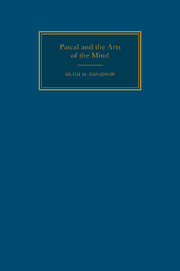2 - Elements, complexes, and geometric
Published online by Cambridge University Press: 26 January 2010
Summary
INTERPRETATION
What happens when Pascal assigns to the geometrical mode of thinking the status of a dominant or controlling art? What activities and habits of mind appear as he does his work within the bounds of that discipline? It seems to me that each of the four arts that I have taken to be fundamental undergoes, under the présidence of geometric, interesting modifications. The operations basic to them – statement, invention, connection, systematization – are all transformed in various ways that adapt them to the requirements typical of an attitude in which Pascal puts a premium, in the search for truth, on making explicit (1) the least parts or factors in every situation and (2) the conditions under which those elements may be recombined into a complex that will be satisfactory in theory or effective in practice. In the present section, I should like to offer some remarks on the consequences for the art of statement and interpretation when it finds itself in the régime of geometric.
MANY DIFFERENT STATEMENTS
Let us approach the subject genetically, as though we were watching Pascal's strategy of composition coming into being. To treat the question thus has its dangers; as I go along, I shall try to make clear the part of hypothesis and to show that it is a way of covering and explaining the main facts.
It seems fair to say, first of all, that as an intellectual artist in this mode Pascal must direct his attention regularly to statements: statements of facts, of truths, of judgments.
- Type
- Chapter
- Information
- Pascal and the Arts of the Mind , pp. 24 - 104Publisher: Cambridge University PressPrint publication year: 1993

